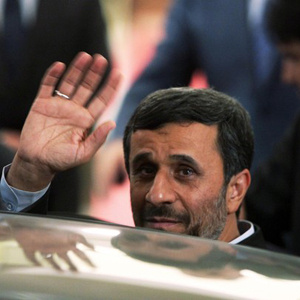Ten Points on Ahmadinejad’s Visit to Lebanon

2. While the international tribunal on Rafik Hariri’s assassination has plunged Lebanon’s politics into crisis once again, and tension between Hezbollah and Saad Hariri has resurfaced, Ahmadinejad kept a neutral stance during his visit, regarding the case as one of the domestic concern of Lebanese parties.
3. Ahmadinejad’s meeting with Lebanese politicians from diverse groups and factions and his consideration of Lebanon’s unity actually disarmed his Lebanese opponents, as they felt the Iranian president has modified his attitude towards them.
4. Ahmadinejad followed his dual rhetorical policy during the visit: diplomatic during formal meetings, and provocative in two speeches made to the public. All Lebanese parties, some of them accused of being mercenaries of the US and Israel in the hard-line Iranian media, were invited to a luncheon with the Iranian president, some even greeting him warmly. Nevertheless, the speeches made by the Iranian president in Dahieh –Hezbollah’s stronghold in Beirut- and Bint Jbail Stadium in southern Lebanon, were what one might expect of Ahmadinejad.
5. There is a fact that Ahmadinejad and his diplomatic team may have missed: Lebanon may be an enemy of Israel, but no one can doubt its friendship with the United States. Anti-American comments are not what all the Lebanese political groups like to hear in their country. Ahmadinejad’s restatement of his doubts over the 9/11 terrorist attacks was hardly diplomatic. The Iranian president also spoke of an alliance between Iran, Syria, Turkey, Iraq and Lebanon. Such a self-proclaimed alliance, stated in a volatile country like Lebanon, caused unfriendly reactions. Saad Hariri, and his key regional supporter Saudi Arabia, must have frowned when they heard these remarks.
6. On the matter of the Middle East Peace Process, Ahmadinejad took a moderate and diplomatic stance in his formal talks with Lebanese leaders—who might have informed him on the proceedings of the Beirut Conference of Arab leaders held in November 2008 (which supported a peace plan that returned to the Palestinians the 1967 occupied territories). Ahmadinejad, nonetheless, returned to his typical fiery anti-Israel rhetoric in Dahieh ad Bint Jbail.
7. While some speculated that the Iranian president might bring with himself a proposal to resolve the problem between Hezbollah and Saad Hariri over Rafik Hariri’s tribunal, Mahmoud Ahmadinejad preferred to avoid this extremely sensitive issue and instead ask both sides to maintain unity.
8. What the well-off Saad Hariri is usually criticized for—lavish spending on political ceremonies— was this time instead encouraged by Hezbollah to make the preparations and a reception ceremony for Ahmadinejad as flamboyant as possible. Another finance-related point: The Iranian president promised another billion dollars in aid for the reconstruction of Lebanon after the 2006 Israel-inflicted damages, while no legal body in Iran has actually approved such a decision.
9. In response to Ahmadinejad’s wish to sign a defense agreement with Beirut, the Lebanese government cautiously shelved this request due to the sanctions imposed by the UN Security Council.
10. Unlike former President Khatami’s visit to Lebanon in 2003, which had attracted all the major factions in Lebanon, Ahmadinejad’s speeches were targeted to a homogeneous group: Lebanese Shi’as.
Davoud Shari’ati Dehaqan is Iran’s former ambassador to the Organization of Islamic Conference.

